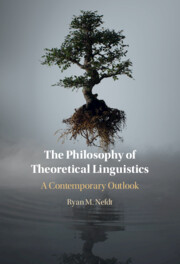
-
Select format
-
- Publisher:
- Cambridge University Press
- Publication date:
- 25 April 2024
- 02 May 2024
- ISBN:
- 9781009082853
- 9781316514252
- Dimensions:
- (229 x 152 mm)
- Weight & Pages:
- 0.495kg, 244 Pages
- Dimensions:
- Weight & Pages:
You may already have access via personal or institutional login
Book description
What is the remit of theoretical linguistics? How are human languages different from animal calls or artificial languages? What philosophical insights about language can be gleaned from phonology, pragmatics, probabilistic linguistics, and deep learning? This book addresses the current philosophical issues at the heart of theoretical linguistics, which are widely debated not only by linguists, but also philosophers, psychologists, and computer scientists. It delves into hitherto uncharted territory, putting philosophy in direct conversation with phonology, sign language studies, supersemantics, computational linguistics, and language evolution. A range of theoretical positions are covered, from optimality theory and autosegmental phonology to generative syntax, dynamic semantics, and natural language processing with deep learning techniques. By both unwinding the complexities of natural language and delving into the nature of the science that studies it, this book ultimately improves our tools of discovery aimed at one of the most essential features of our humanity, our language.
Contents
Metrics
Altmetric attention score
Full text views
Full text views help Loading metrics...
Loading metrics...
* Views captured on Cambridge Core between #date#. This data will be updated every 24 hours.
Usage data cannot currently be displayed.
Accessibility standard: Unknown
Why this information is here
This section outlines the accessibility features of this content - including support for screen readers, full keyboard navigation and high-contrast display options. This may not be relevant for you.
Accessibility Information
Accessibility compliance for the PDF of this book is currently unknown and may be updated in the future.


